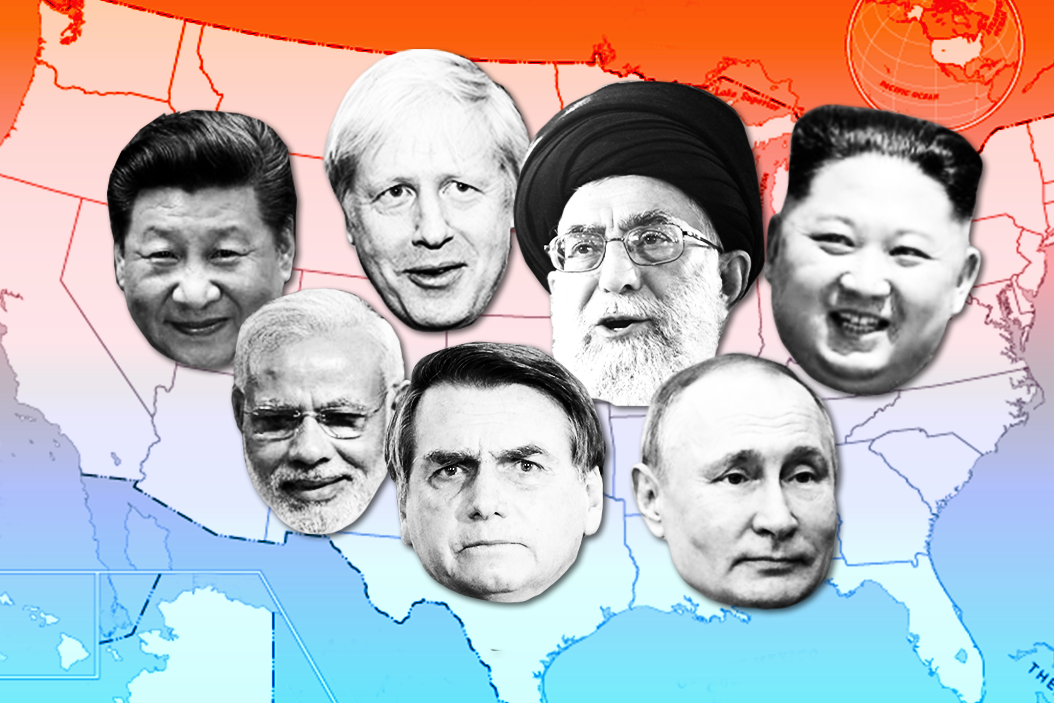As American political news junkies get ready for what is expected to be a very long US election night, around the world a select group of world leaders will also be refreshing the FiveThirtyEight homepage with their own interests in mind, scrutinizing incoming results from the electoral college battleground states that will determine whether President Donald Trump is reelected or Joe Biden wins the White House. Let's put you in their shoes.
If you're Vladimir Putin, this year feels different. You're not as involved as you were in 2016, and you don't hate Joe Biden nearly as much as you despise Hillary Clinton. But still, you'll be keeping an eye on Pennsylvania, which will likely be the last swing state to count all its votes, because at the end of the day you don't want either candidate to win outright. You crave confusion, chaos, and court battles that'll further erode trust in the US election system.
On the other hand, if you're Xi Jinping, you don't want civil unrest to delay the result. You like your five-year plans, and you want to know ASAP which US leader you'll be working with for the next four years. Although it won't make much of a difference these days now that Democrats and Republicans agree that you're bad for America, you've spent weeks analyzing demographic shifts in the Atlanta suburbs to figure out whether the GOP will hold Georgia. If it does and Trump gets reelected, you know he'll be tough(er) on China. But he won't bring many European and Asian friends to the fight, unlike Biden who plans to get everybody who has a beef with you on the same page.
If you're Ali Khamenei, supreme leader of Iran, in Great Satan's election you're rooting for Biden — the devil you've known longer, the one you know you can make a new (nuclear) deal with. That's why you'll be tracking turnout in Arizona's Maricopa County, the exact spot you think might put Biden over the top. Then you'll have your own election to worry about next year (a hardliner victory will make that deal a bit harder to pull off, though).
Deal-making is also on your mind if you're Boris Johnson. As the UK's prime minister, you'll be watching — under lockdown in Downing Steet — early returns from Macomb County, where unexpected mass turnout by Trump voters could keep Michigan red. That may improve your odds of signing a trade agreement with the US in the near term, which Biden might not entertain unless you back down on a no-deal Brexit. On the flip side, do you really want four more years of Trump's diplomatic "capriciousness"?
Now, imagine you're Narendra Modi obsessing over voter turnout in North Carolina's "research triangle" in Chapel Hill-Durham-Raleigh, where many Indian Americans have landed top-notch IT jobs. Although almost three quarters of them will be voting for Biden, you're torn between the candidate who will give more H1-B visas to India's best and brightest, and a kindred spirit in your dislike of China and Muslims.
If you're Jair Bolsonaro, you'll be looking for the latest data from Florida's famously competitive Miami-Dade County, where you hope your fellow Latinos will come out in droves for Trump. After all you're one of only a handful of world leaders who have endorsed your buddy — and you've got a lot riding on his reelection. You're wary of Biden, who won't let you get away with destroying the Amazon rainforest, nor take kindly to your anti-LGBTQ tirades.
Finally, picture yourself as chain-smoking Kim Jong-un, bespectacled eyes glued to your ultrawide flatscreen TV in your sumptuous Pyongyang palace, hoping suburban women in Wisconsin won't abandon Trump like most polls say they will. You need someone to talk to, and don't expect Biden to respond to your letters, let alone meet with you like Trump (although Joe probably won't even try to talk you into giving up North Korea's nukes).
For more from our extremely nervous world leaders, follow us on Twitter, where we hear there may be a US election night hostile takeover by Puppet Regime....
More For You
100 million: The number of people expected to watch the Super Bowl halftime performance with Bad Bunny, the Puerto Rican superstar and newly minted Album of the Year winner at the Grammys.
Most Popular
Think you know what's going on around the world? Here's your chance to prove it.
An imminent US airstrike on iran is not only possible, it's probable.
Americans are moving less — and renting more. Cooling migration and rising vacancy rates, especially across the Sunbelt, have flattened rent growth and given renters new leverage. For many lower-income households, that relief is beginning to show up in discretionary spending. Explore what's changing in US housing by subscribing to Bank of America Institute.
